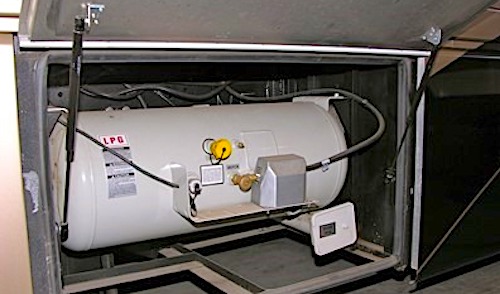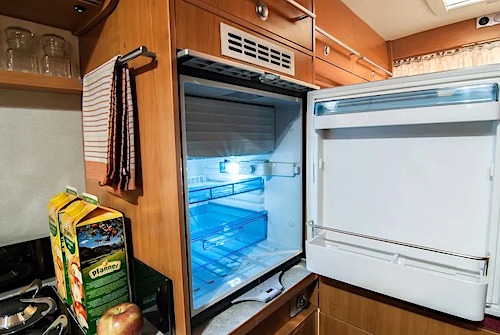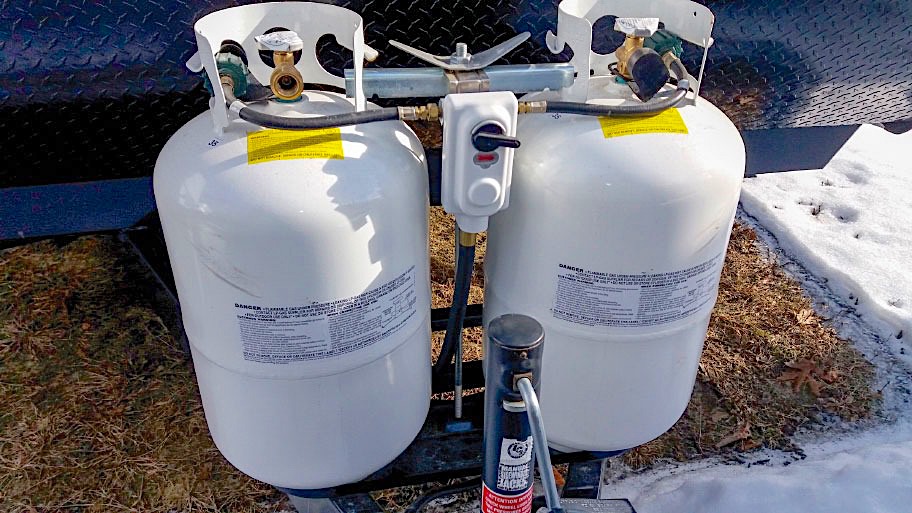Thanks for your support! If you make a purchase using our links in this article, we may make a commission. And, as an Amazon Associate, I earn from qualifying purchases. See the full disclosure here.
Propane is one of the most valuable resources you have when you’re driving an RV or travel trailer. As a result, you might ask the question, Is it ok to drive an RV with the propane on? It’s a reasonable question to ask as you might have concerns about your safety. Unfortunately, there isn’t a straightforward answer. The answer varies based on where you live.
Propane is used by RV and travel trailer owners to power their heat, generator, and other appliances. It is an essential resource for people who spend a lot of time on the road in their RV or travel trailer. However, it’s important to be responsible for an incredibly flammable resource like propane. So, finding out everything you can about propane safety and legality is essential. Otherwise, you’re exposing yourself to unneeded risk.
So, if you’re interested in learning more about the safety and legality of propane as it relates to RVs and travel trailers, continue reading. We’ll provide you with all the information you need for your next trip.
Is it Legal to Drive an RV with the Propane On?

As you might guess, laws relating to using propane while driving an RV differ based on where you live. There are different laws in different states and provinces in the United States and Canada. Most locations do not have laws that restrict the use of propane while driving an RV. However, there are some places, such as British Columbia, that restrict the use of propane while the RV is in motion. As a result, you will need to do your research and make sure you know what the law is in the locations you’ll be driving.
Laws can also be different based on the type of road you’re driving on. For example, there are more locations that have laws that require propane to be turned off on the highway. However, they might not have laws requiring propane to be turned off on other roads.
As a result, the laws you need to follow may be different based on where you’re traveling and the types of roads you’ll be driving on. Make sure you do your research thoroughly because the last thing you want is to be uninformed on laws you need to follow. Being uninformed could lead to you breaking a law by accident. So, you need to do your research so something of that nature doesn’t happen.
Is it Legal to Drive a Travel Trailer with the Propane On?
If you didn’t know the difference between an RV and a travel trailer, we’ll explain that briefly. An RV is a motor home that you drive like you would a car except you can live in it and it’s full of amenities. A travel trailer is like an RV because you can live in it and it’s full of amenities. However, it is not driven on its own. Instead, a travel trailer is pulled by a car. As a result, there are fewer restrictive laws pertaining to propane when it comes to travel trailers. This is because the travel trailer isn’t directly attached to the motor of the vehicle, so it’s less likely that propane could have a negative effect on it.
So, if it wasn’t clear, you are legally allowed to tow a travel trailer with propane running. However, you are not void of risk when you’re doing so, so you’ll be doing so at your own risk. You need to take the proper precautions before driving if you plan on leaving the propane running.
Is it Dangerous to Use Propane Gas While Driving an RV?
If you’re planning on using propane while driving an RV, you should be aware of the potential risks. The biggest risk when traveling with propane on is that when you’re driving, it’s easy for appliances to shift. This is because while driving you’re in motion so things that aren’t bolted to the ground will naturally shift around when there are bumps or sudden movements.
With these bumps and movements, there’s the risk that propane lines can break. This will cause gas to escape the tank which can be very dangerous. If this were to happen, it would only take a small spark to ignite propane gas. So, if your propane line breaks, a fire could start in an instant.
If you plan on driving with your propane on, you should note that most states require you to turn it off when you enter a tunnel. It’s also recommended that you turn it off when you enter a gas station. This is because there is a higher risk of a fire or disastrous situation at a gas station.
Can I Run My RV Fridge on Propane While Driving?

You can run your RV fridge on propane while driving, but there are some risks associated with it. The most obvious risk is that there could be a fire or explosion that comes as a result of the propane. This risk mostly exists if something were to go wrong while you were driving. For example, if you got in an accident or if a tire blows out, having propane running could amplify the problem. If one of those things happened, there’s an increased risk that the gas line running underneath the RV could rupture and leak.
It wouldn’t take much to start a fire or explosion, so you need to be careful if you plan on keeping your propane running. All it would take is an ignition source and you could have a massive fire on your hands.
How Long Can You Run an RV Fridge on Propane?
Typically, most RV fridges can run on propane for weeks without the propane gauge changing at all. Most recent fridges have been designed with fuel economy and low emissions in mind. This is a nice change because previous versions of RV fridges were heavy consumers of propane. Additionally, the newer versions are more efficient in terms of combustions, which makes them safer. This is because, with fewer emissions, far fewer dangerous products will be released into the atmosphere.
Does the RV Fridge Need Battery to Run on Propane?
Most RV fridges require a battery to run on propane. However, the type of battery you use will have a significant effect. The strength of the battery will affect the efficiency of the propane. In other words, if you have a stronger battery, you will have better fuel efficiency with your propane. Conversely, if you have a weaker battery you will notice that your propane gets used up much quicker. As a result, although a better battery will cost more, it will be more cost effective in the long term to purchase a stronger battery. With a stronger battery, you won’t need to spend as much money refueling your propane tank in the long term.
All the Information You Need About Propane in RVs and Travel Trailers
After reading, we hope you have all the information you need about propane in RVs and travel trailers. We know there’s a lot to learn about laws and safety regulations when it comes to propane, but it’s important to take your time to learn everything you can on the topic. The last thing you want is to break a law or endanger yourself because you didn’t know about a law or regulation. Failing to abide by these laws and regulations could lead to severe consequences legally and to your well being.
Whether you’re a new or experienced RV owner, keeping up to date with the laws about propane is important. They can be different based on where you live, and they can be changed. As a result, you need to keep up to date with the laws where you live and stay informed. Failing to do your research about something that affects your safety and others would be irresponsible. With that said, we hope that the information we provided was helpful to you as you get ready for your next road trip!
Are you a new or experienced with RVs and travel trailers? Have you used propane for something that isn’t related to RVs? Let us know in the comments!



As a general rule, you should TURN YOUR PROPANE OFF while traveling.
Propane Fires are the NO. 2 reason for RV Accidents. The No. 1 RV Accident reason is AGE and Inexperience of the RVer.
I researched this several years ago and DOT does keep statistics on RV Fires and Accidents! You can search the DOT website!
Safety should never be taken lightly!
I use a product called “GAS STOP”! Designed to shut off your propane should a leak occur! But, this product should only be used while you are parked or in a Campground! Not while traveling!
You can research RV Fires as well and see that most RV fires were the result of RV refridgerators that had propane problems!
Your best and safest bet is to TURN OFF YOUR PROPANE WHILE TRAVELING!!!!!
We attended an RV show where a fireman spoke how dangerous and foolish it is to drive with propane on. We blew a rv tire and the rubber almost hit the propane hose .
It is very possible to damage a propane fridge if it is operated significantly off-level for a relatively short time. If traveling with propane on and stopping at a roadside attraction it is often the case that you park very much off level. So while you take a short hike you may damage the fridge. Better to make turning off the propane one of your getting-on-the-road checklist items. Your fridge and freezer will easily keep your food safe during the hours between your campsites.
Good info. We just bought our first travel trailer. Thursday is our first day out with it.